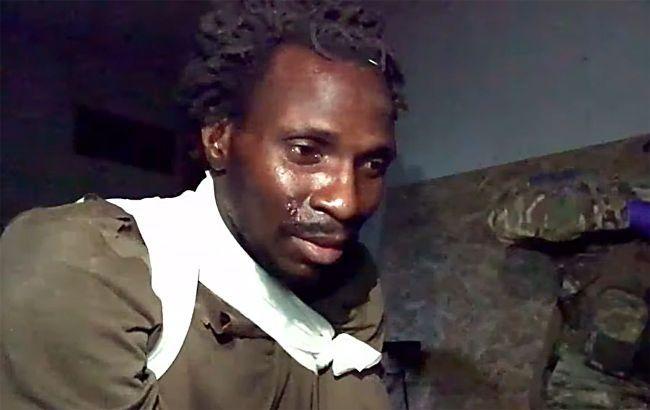Student Village Academy › Forums › GENERAL DISCUSSIONS › Nigerian Mercenary Fighting for Russia Captured by Ukrainian Forces
Tagged: Russia
- This topic has 0 replies, 1 voice, and was last updated 7 months, 3 weeks ago by
 Precious.
Precious.
-
AuthorPosts
-
-
July 6, 2025 at 5:42 PM #80548
 PreciousParticipant
PreciousParticipantA Nigerian national, Kehinde Oluwagbemileke, has been captured by Ukrainian forces after spending five months fighting as a mercenary for the Russian military in the ongoing war in Ukraine.
The 29-year-old, who was previously convicted on drug-related charges in Russia, had opted to fight for the Kremlin in exchange for a reduced prison sentence—a route that many foreigners, especially from Africa and Asia, have taken under Russia’s controversial prisoner recruitment programme.

But for Kehinde, the gamble has ended in captivity—and regret.
From Prison Cell to Battlefield
According to Ukraine’s “I Want to Live” project, which facilitates the surrender and safe defection of Russian soldiers and collaborators, Kehinde was captured by the Freedom of Russia Legion, a unit made up of Russian defectors now aligned with Ukrainian forces.
He was apprehended in the Zaporizhzhia region, where fighting has intensified over recent months.
Ukrainian authorities revealed that Kehinde had been living in Russia for four years before his arrest and conviction under Article 228 of the Russian Criminal Code for drug offenses. Instead of serving his full sentence, he accepted the Russian military’s offer to join the “Special Military Operation” (SVO) in Ukraine as a pathway to freedom.
“Kehinde is one of thousands of foreign mercenaries recruited by Russia’s Defence Ministry to fight in Ukraine,” a representative of the I Want to Live project stated.
“We’ve already published data on nearly 7,000 foreign fighters from 14 countries, but that’s only a fraction. These fighters are often used as cheap, expendable manpower, drawn from prisons and poor communities.”
Full Interrogation Transcript Released
The Freedom of Russia Legion released a video and transcription of Kehinde’s interrogation. In the footage, he appears injured, subdued, and remorseful. Here’s the verbatim transcript:
Interviewer: Our stormtroopers have returned from a mission with an unusual trophy—Kehinde Oluwagbemileke. Apparently, due to a shortage of cannon fodder, Putin’s commanders are luring foreigners by deception to “defend the Motherland” in far-off Ukraine.
Interrogator: What is your passport?
Kehinde: Russian.Interrogator: Russian passport?
Kehinde: Yes, Russian passport.Interrogator: What did you do before?
Kehinde: Before?Interrogator: Before joining the SVO. You joined the SVO?
Kehinde: Yes.Interrogator: Why did you go to war?
Kehinde: For quick liberation.Interrogator: Were you in prison?
Kehinde: Yes, in prison.Interrogator: And then they freed you?
Kehinde: Yes.Interrogator: How long have you been in the army?
Kehinde: Five months.Interrogator: Five months? Where is your family?
Kehinde: In Nigeria.Interrogator: In Nigeria? Does your family know you went to war?
Kehinde: No.Interrogator: They don’t know? Do you regret it?
Kehinde: Of course.Interrogator: Do you regret going?
Kehinde: Of course. It’s… broken. (points to wounds)A Growing Trend of Foreign Casualties
Kehinde’s story is not unique. His capture follows just days after the Ukrainian Armed Forces detained Wang Wu, a 24-year-old Chinese national fighting for Russia. Both are part of what experts say is a disturbing trend: thousands of foreign nationals, many vulnerable or desperate, lured into Russia’s war machine with promises of early release, money, or citizenship.
“These fighters are often thrown into the most dangerous zones,” said an analyst with I Want to Live. “They are not trained like professional soldiers. They’re seen as disposable.”
Russia’s Recruitment Strategy Under Fire
The Kremlin has come under increasing scrutiny for its recruitment of non-Russian prisoners and undocumented migrants for front-line combat. Many, like Kehinde, sign up under immense pressure, often without fully understanding the risks—or alternatives.Kehinde now faces an uncertain future, held in Ukrainian custody far from home, carrying the weight of a decision made under duress.
For now, his family in Nigeria remains unaware of his fate.
-
-
AuthorPosts
- You must be logged in to reply to this topic.

